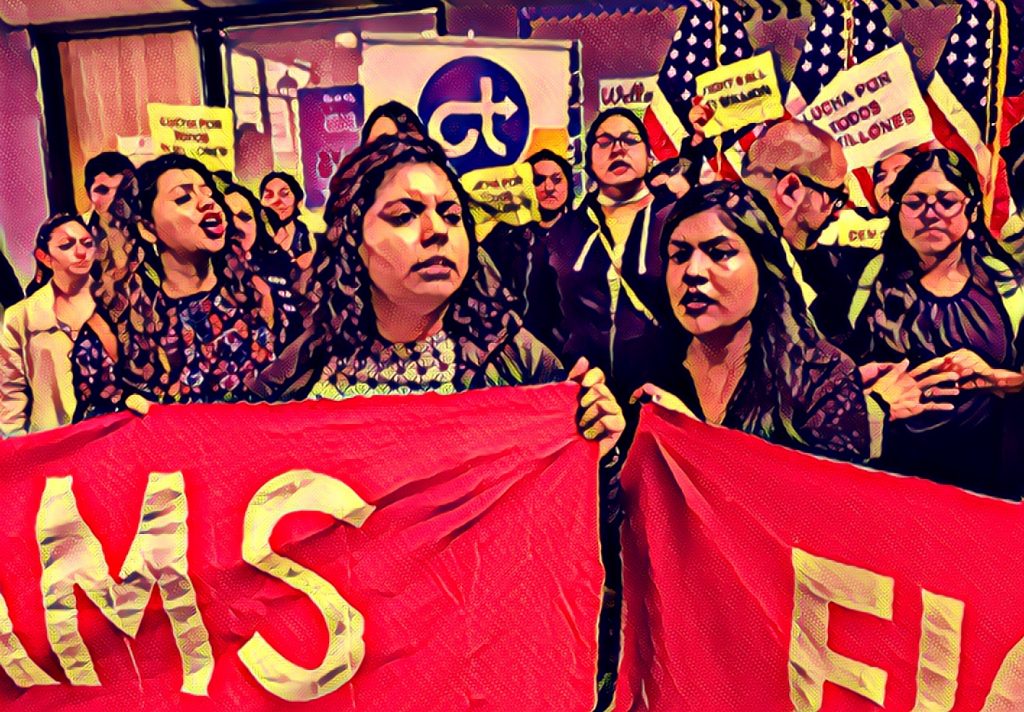On Monday night, I listened to Kendrick Lamar in preparation for my poetry and leadership workshop for high school students every week when I got a call asking if I heard about what happened in San Francisco.
That morning, undocumented youth interrupted House Minority Leader Nancy Pelosi (D-Calif.) during a press conference about her dinner with Trump last week regarding a compromise for immigration reform. Media outlets, politicians and even undocumented people began to critique the protesters for not cooperating with those who are on “their” side.
We’ve seen this before. Those who are directly impacted seeking to reclaim their own story are publicly ignored by stakeholders and shamed for interrupting. Two summers ago, Jennicet Gutierrez, a trans immigrant woman, interrupted President Barack Obama during his speech on the LGBTQ Community in the White House. Gutierrez became a villain to those around her that day and in the months that followed for wanting to be heard.
Bringing this all back to K-dot, cultural critic and writer Hanif Willis-Abdurragib, in a timely article on the rapper I listened to before getting word about the Pelosi protest.
“I have not touched the streets of Compton as Kendrick Lamar Duckworth has touched the streets of Compton, and it is vital to have prophets of their own geography,” Willis-Abdurragiv writes.
I bring up Willis-Abdurragib’s words because they highlight the consistent need for even amazing writers and politicians to acknowledge the importance of truly listening to those they seek to write about or represent. In conceptualizing K-dot’s good kid, m.A.A.d city, Willis-Abdurragib asks us to listen:
“The Good Kid is both hero and villain, sometimes within the same hour. America loves its narrators but wants them to be reliable or to tie a story in a bow for an audience,” Willis-Abdurragiv writes.
And that’s the way liberals like their undocumented immigrants, too. I spoke with Luis Serrano, one of the organizers with the California Immigrant Youth Justice Alliance (CIYJA) who was part of the coalition that decided to interrupt Pelosi. We talked about the way he saw the action, the overwhelming phone calls from reporters who are aching for a headline and the importance of understanding the context of Monday’s protest.
The DACA program will go down in history as an Obama-era policy that Trump campaigned against and successfully took away once elected. What needs to be told, however, is the years of organizing queer undocumented youth engaged in leading up to the DACA announcement in the White House rose garden in the summer of 2012.
Serrano, reflecting on these past efforts and on Monday’s backlash, told me that it’s “the usual… where they may not agree with it, but then once it becomes the popular idea they jump on board.” The “it” being the historic use of interruption in order to force the “they” who seek to push for legislation to listen to what the people affected really need and want.
Serrano repeatedly emphasized how critical it is for anyone who watches the videos of Monday’s protest to understand what it is they are asking for. The youth activists didn’t demand a revival of DACA; the protest was for the people that couldn’t be there, the 11 million.
“We need to start meeting people where they’re at, a lot of undocumented people are poor, they’re struggling,” Serrano said. “Those who disagree with our strategy need to understand that it is not about them, it is about the collective.”
Serrano echoes the words of another CIYJA organizer, Sandy Valenciano in the Huffington Post.
“Continue fighting back against the narrative of “dreamers” vs.“criminals” that continues to give politicians a pass on addressing the almost remainder of undocumented people in this country. This means that we must create pressure and hold Democrats accountable to fight for the protection of all, and not just a few,” Sandy writes.
Protests are messy to bystanders, the same way rap music is loud to those who don’t truly listen to it and only hear it.
Serrano shared with me that before organizing for the liberation of everyone, he toiled next to the undocumented workers who Trump and Pelosi will criminalize in order to pass an immigration bill that will only legalize those inside the confines of what is a desirable immigrant.
“Build for the long term and that takes sacrifice, and it’s not easy… but people who have organized before us, that’s what they did, they sacrificed their life, their well-being, some became political prisoners, some became exiles in order to create a society where we don’t have to have this again and we need to keep continuing building on that,” Serrano said

is an undocumented queer writer and researcher based in Los Angeles, CA via Acapulco Guerrero Mexico. They are the co-editor of Chispa OC with Hairo Cortes. They’ve written for research initiatives at UCLA and UCI and currently contributing to the OC Weekly. Before researching and writing full time, they were a youth organizer in Anaheim for five years with OCCCO. Fun fact: Francisco is also an alum of the Macondo Writers Workshop where they met Karla!
Follow francisco



